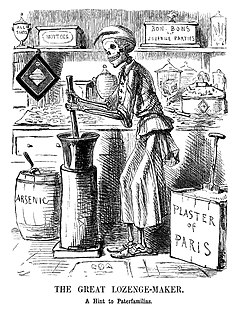
Back ブラッドフォード毒入り菓子中毒事件 Japanese Arsenikförgiftningen i Bradford 1858 Swedish 1858年布拉德福德糖果中毒事件 Chinese
 Cartoon in Punch, November 1858 | |
| Date | 30 October 1858 |
|---|---|
| Location | Bradford, England |
| Cause | Arsenic poisoning |
| Casualties | |
| 200+ | |
| Deaths | 20 or 21[a] |
In 1858 a batch of sweets in Bradford, England, was accidentally adulterated with poisonous arsenic trioxide. About five pounds (two kilograms) of sweets were sold to the public, leading to around 20 deaths and over 200 people suffering the effects of arsenic poisoning.
The adulteration of food had been practised in Britain since before the Middle Ages, but from 1800, with increasing urbanisation and the rise in shop-purchased food, adulterants became a growing problem. With the cost of sugar high, replacing it with substitutes was common. For the sweets produced in Bradford, the confectioner was supposed to purchase powdered gypsum, but a mistake at the wholesale chemist meant arsenic was purchased instead.
Three men were arrested—the chemist who sold the arsenic, his assistant and the sweet maker—but all three were acquitted after the judge decided as it was all accidental, there was no case for any of them to answer. The deaths led to the Adulteration of Food or Drink Act 1860, although the legislation was criticised for being too ambiguous and the penalties for breaching it too low to act as a deterrent. The deaths were also a factor in the passage of the Pharmacy Act 1868.
- ^ Jones 2000.
- ^ Whorton 2010, p. 163.
Cite error: There are <ref group=lower-alpha> tags or {{efn}} templates on this page, but the references will not show without a {{reflist|group=lower-alpha}} template or {{notelist}} template (see the help page).
© MMXXIII Rich X Search. We shall prevail. All rights reserved. Rich X Search